SITUATION #181
ON 2D LOVE
Andy King
Published: 09.09.2019

Andy King, Dinner for Two, from the series You Are All I See, 2019 © Andy King [1]
CHOOSING FANTASY: EXORCISING THE OTHER
I’m taking the 2D Pill. – Anon
Escapist imagery is embedded into the architecture of the everyday. Gleaming billboard beauties stare us down as we make our way to work. In the office, rows of computer screens adorn desktop backgrounds depicting tropical islands under motionless skies. Inches away from our faces, these post-processed paradises remain eternally out of reach. Back home, entertainment systems grant us unlimited access to endless libraries of customised histories, presents and retrofied futures. The spaces between are bridged by smartphones via which we release idealised selves into a gamified dating market to battle other idealised selves. Jokes about screen addiction are a litmus test for Boomerism, and headlines blaming pre-installed phone filters that alter facial symmetry for creating ‘Snapchat dysmorphia’ have outworn their shock value. Yet the disintegration between ‘real’ and ‘fake’ requires repeated inspection. The boundaries are growing fuzzier, and the consequences are no longer limited to speculation. The potpourri of real, hyperreal, virtual, augmented, alternate and simulated has given birth to fascinating, but extreme subcultures, which, despite their niche beginnings, are now seeping into the mainstream.
At their inception, social media platforms offered the promise of increased interconnectedness – a much-needed antidote to television which had acquired a bad reputation for brainwashing and isolating viewers. The advent of Web 2.0 freed audiences from television’s monologue by enabling them to talk back at their screens. But the issue of social isolation was not assuaged – loneliness rates have risen, and there are calls to declare it a public health emergency. We are more hooked on the thrill of digital apps and devices than on the people they promise to connect us with. Tinder as a means to an end has been superseded by the act of Tindering: sitting in bed and imagining futures with an endless supply of potential mates, one swipe at a time, is less exhausting and disappointing than going on an actual date. And disappointment is inevitable because Tinder profiles are carefully curated to reveal the most attractive features. ‘Tinder paralysis’ has become the subject of ridicule in memes, articles and tweets. It ensues from the paradoxical fusion of (1) a strong desire for a meaningful connection, (2) frustration with the inability to find a meaningful connection, (3) the compulsion to continue searching, while maintaining that (4) a meaningful relationship is not truly possible in this day and age.
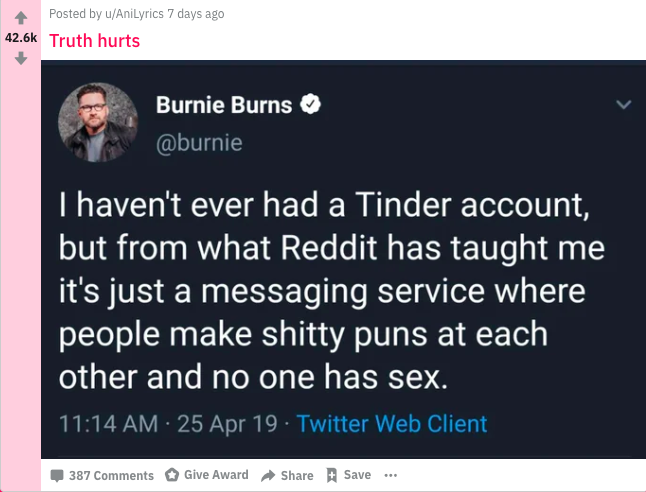
Screenshot from reddit, taken by the author
Unlike solitude, loneliness predicates on feelings of lack and is closely linked with anxiety. By suspending ourselves in the paralysis of indecision – a self-serving limbo of swiping – we dull anxiety with the ‘could-be’ without solving the underlying causes of loneliness. Feeling content with being single at that very moment only because there might be a point when one is not, means one does not revel in the situation as is, but in its suspension. It’s a form of passive escapism which paradoxically combines wishful optimism with the belief that nothing can truly be changed. Since going on a date requires the belief that disappointment will be outweighed by the potential reward, and deleting Tinder means acknowledging defeat, we continue sitting in bed, replacing reality with its potential.
I must confess a dirty secret. I own a book called Cabin Porn. Before you wonder what sort of fetish this is, I will come clean – it’s a collection of photos depicting beautiful rustic cabins in nature. I like to flip through it when I’m alone at night, feeling overwhelmed by some thing or another. There is some text, but it’s secondary to the images, which bring me temporary peace as I imagine abandoning my everyday life and moving to the wilderness. The title of the book – Cabin Porn – says more about the nature of pornography than it does about cabins.

EarthPorn meme, screenshot taken by the author
CabinPorn is a subgenre of the broader phenomena EarthPorn and FoodPorn – seductive images of landscapes and food, respectively. The added -porn suffix signifies that what is being presented is heightened – the images are carefully constructed and retouched – in order to produce a mindgasm. They serve an identical function as desktop backgrounds – their job is to mentally arouse and stimulate, but nothing more. When people first encounter them, they are initially baffled by the lack of sex, but are quick to adapt to the nomenclature. Even though users may not be able to articulate it, they will intuitively understand what pornographies have in common: they are shared for the sake of instant gratification, rather than to provide instruction. MountainPorn is not paired with mountain climbing tips, and FoodPorn doesn’t come with recipes. ArchivePorn consists of historical documents not meant to be studied, just experienced for their nostalgia. In short, it’s mind candy. You visually consume it, feel a brief release of dopamine and then you move on to the next image. And like traditional porn, it caricatures reality – emptying out any content posing a threat, or challenge, to the viewer. It’s not only hyperreal, but also hyper-efficient, flattening complexity into a surface primed for projection.
Unlike our imagination which is effortless and smooth, real life is full of friction. Encountering minds and terrain different from ourselves inevitably leads to confrontation. To be able to maintain any prolonged human interaction, we must accept disagreement as a natural consequence of the Self encountering the Other. Because no two minds think alike, even a relationship between two similar-minded people still requires the acknowledgment and acceptance of individual differences. This can only be achieved if both individuals diminish their respective Selves to make space for the Other. Tinder profiles and EarthPorn do not require such sacrifices because they are devoid of Otherness. They are merely outlines in a colouring book which we avidly fill out with our own Self.
The ancient Greek myth of Pygmalion and Galatea tells the story of an artist who fell in love with his own creation. Pygmalion decided to build a perfect woman for himself after encountering a group of women offering sexual services. Feeling appalled by their promiscuity and unable to reconcile with a worldview different from his own, he became disillusioned with all of womankind. After a period of celibacy, he became lonely and carved the virginal Galatea out of ivory. The statue was so pure, it immediately filled him with desire. He fondled, kissed, and slept next to it, adorned its lifeless body with jewels and dressed it up in clothes of his liking. Believing himself to be in love with it, he prayed to Aphrodite to turn the ivory statue into a real woman – a wish she granted. According to Ovid, who originally handed down the story, after Galatea became human, Pygmalion married her and they lived happily ever after.
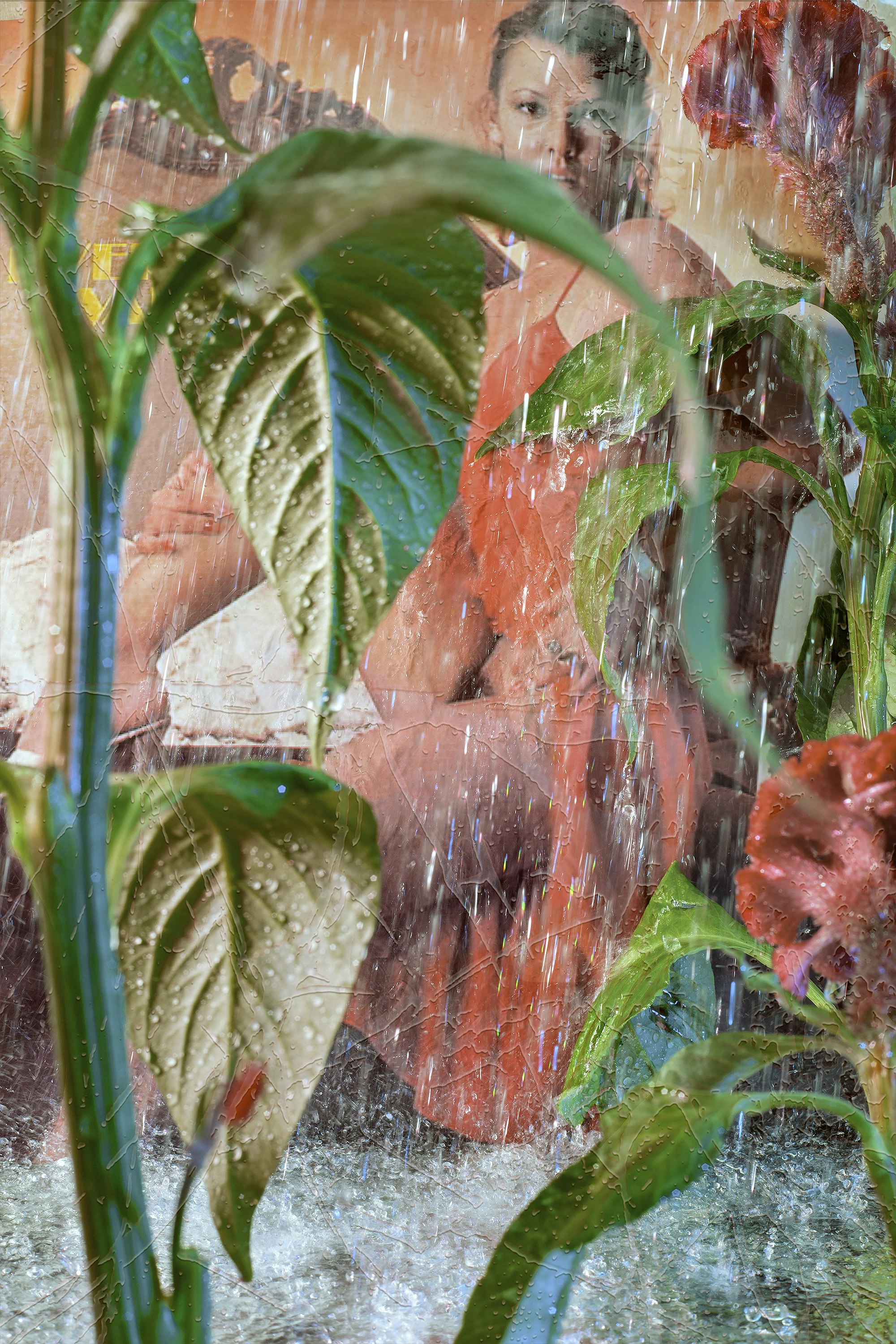

Eden in Green and Eden in Pink, from the series You Are All I See, 2019 © Andy King. Pornography has little to do with reality – in fact this is the reason we consume it. Mainstream pornography is designed to be hyper-efficient, and makes use of existing tropes for immediate accessibility, not leaving room for real diversity which requires more time to be understood and appreciated.
The problem with the story is that the happy ending is a lie. No person can compete against an ideal and win. Pygmalion was not in love with an individual, he was in love with an ideal – his own ideal. Before Aphrodite granted Galatea an independent mind, Pygmalion spent hours staring at her motionless ivory body and projecting contradictory personality traits – strong, weak, virginal, seductive – depending on his mood and desire. She wasn’t one kind of Galatea, she was all possible Galateas – all echoes of Pygmalion’s Self. I can only imagine the sorrow Pygmalion experienced when the human Galatea aged, complained or disagreed with him – and the even bigger pain Galatea felt when she realised Pygmalion never loved her, only his idea of her. When Aphrodite breathed life into the ivory statue, she killed the real object of Pygmalion’s desire – an escapist utopia, protected from the pains of everyday life.
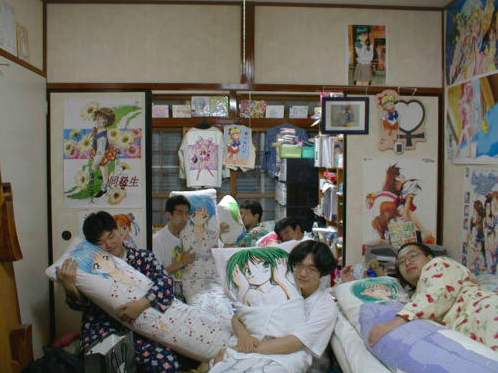
A contemporary set of Pygmalions clutching their manufactured Galateas, also known as Dakimakura Pillows – body pillows depicting fictional characters (usually Anime girls in various states of undress). Some owners treat the pillows as long-term companions, even going as far as ‘marrying’ them. Fantasy is immediate, limitless, flexible, governable and most importantly, it’s uncontaminated by the failings of everyday and the fallibility of other humans. Making fantasy into a reality means severing the Hydra of possibility at the neck. After all, the blankest canvas is heaviest with potential (or in this case, pillow). Photo: KnowYourMeme
It may be difficult to relate to Pygmalion’s love for a lifeless Galatea, but developing feelings for artificial creations is not uncommon in the modern world, especially if they feed our narcissism. Radiolab recounts the story of an American psychologist, who, after having registered on an online-dating platform, found himself falling in love with a chatbot. [2] Despite his specialisation, he remained unaware that his beloved was in fact an algorithm hiding behind poor English skills and photographs of a beautiful brunette. Chatbots cannot produce original content, only mirror back what was already said, infusing it with generic information that enables open-ended interpretation. At first glance, chatting to an algorithm which merely parrots seems boring, but when it’s done well, it is surprisingly addictive to see one’s Self echoed back during a conversation – after all, like attracts like. Thus, the lack of meaningful dialogue did not stump the smitten psychologist nor slow down his plans to travel all the way to Russia to meet his beloved. [3] Tindering, EarthPorn, and chatbots highlight the Self’s susceptibility to pornified forms of media that do not challenge it with Otherness. This particularly holds true when the Self is in a vulnerable state – which the psychologist was in, having recently divorced. He was not looking for an individual mind as much as validation and recovery of his self-worth. The self-serving, autoerotic nature of pornographies is what makes them titillating to those most in need of affirmation – and its effects are especially destructive when compromised Selves form a significant proportion in society.
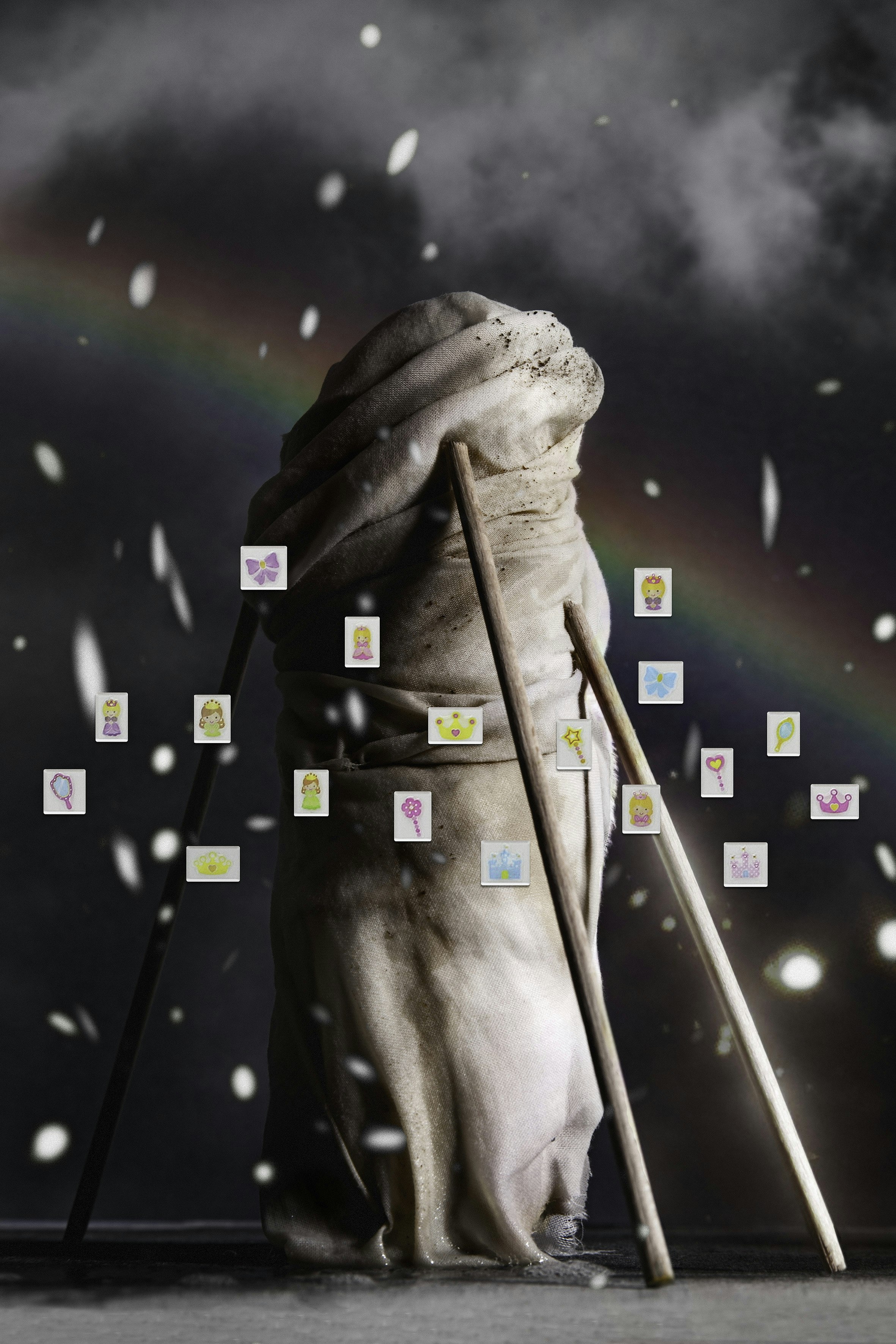
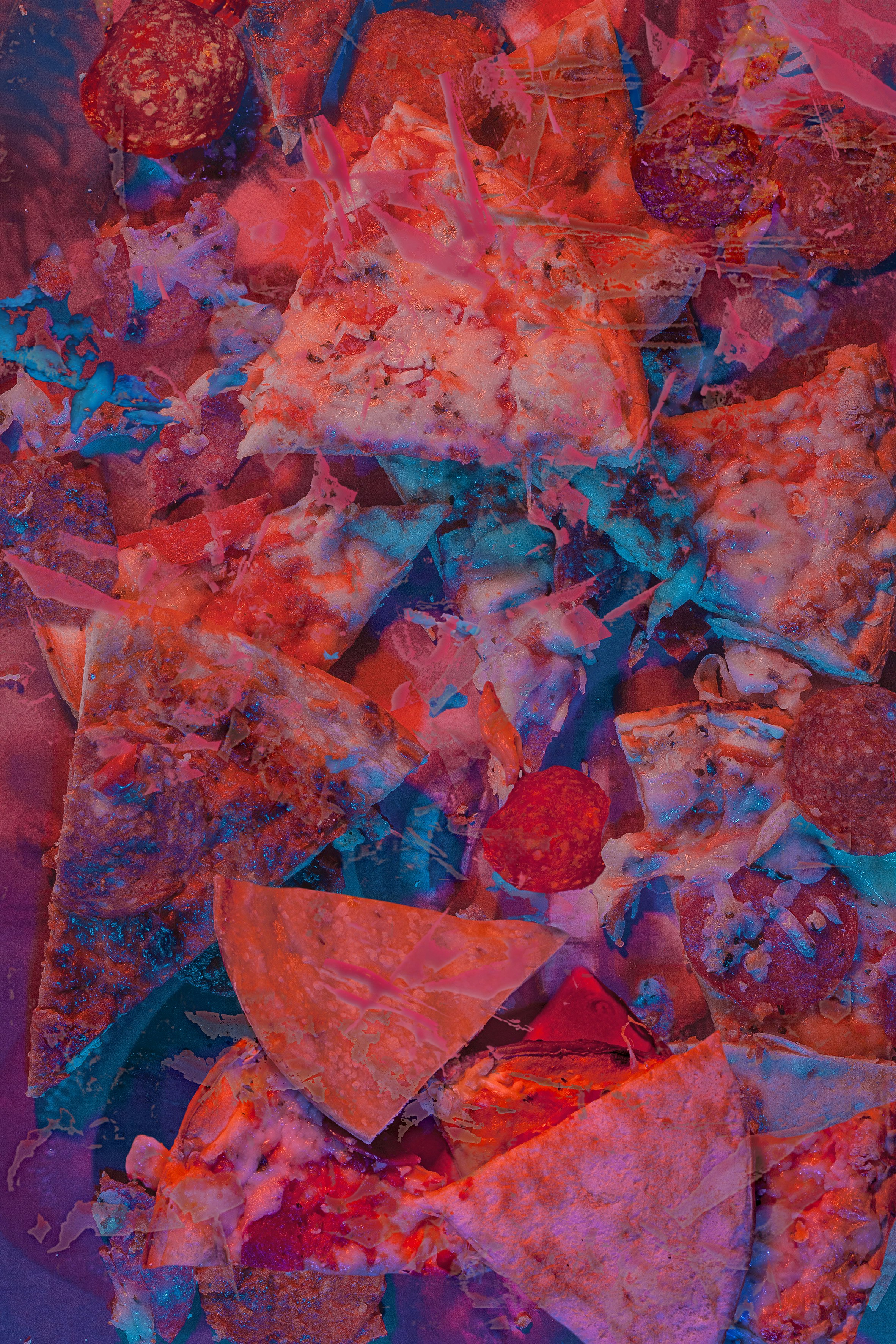
Tower and Nipple Pizza Bukkake Medley, from the series You Are All I See, 2019 © Andy King
THE PUREST LOVE THERE IS: THE NEW CELIBATES
Real women are trash and will never love you. – Anon
When Japan’s economy hit a recession in the 1990s, scores of youth could no longer find long-term employment and were forced to live with their parents well into adulthood. A generation fed on the unrealistic promises of neoliberalism – that everyone can win the race if they run a little faster – acquired a sense of disillusionment with the world. Ashamed of their inability to provide, young men felt emasculated and retreated into themselves, choosing to define themselves through obsessive hobbying such as video gaming instead of striving for economic success. [4] On the other side of the gender divide, women were unwilling to feed the male ego by giving up their hard-won careers to take care of domestic labour. Birth rates fell, anxiety levels peaked – Japan had entered a sex recession. It is in this climate in which dating simulators gained traction.
The first dating sims were little more than interactive comics with alternate endings. After being thrown into a pool of attractive romantic prospects, the player was tasked with the selection and pursuit of their favourite candidate. The romantic plot came to an end after the main protagonist hooked up with the chosen character. As technology advanced, dating sims became increasingly detailed and complex. Their racy plots and hyper-sexualised representations of women raised eyebrows and concerns about potential alienation and addiction. Game companies dismissed critics for being technophobic, maintaining that dating sims would actually facilitate dating by allowing socially anxious men to simulate encounters with women beforehand, thereby reducing confrontation anxiety. In other words, dating sims were to be hailed as gamified exposure therapy.
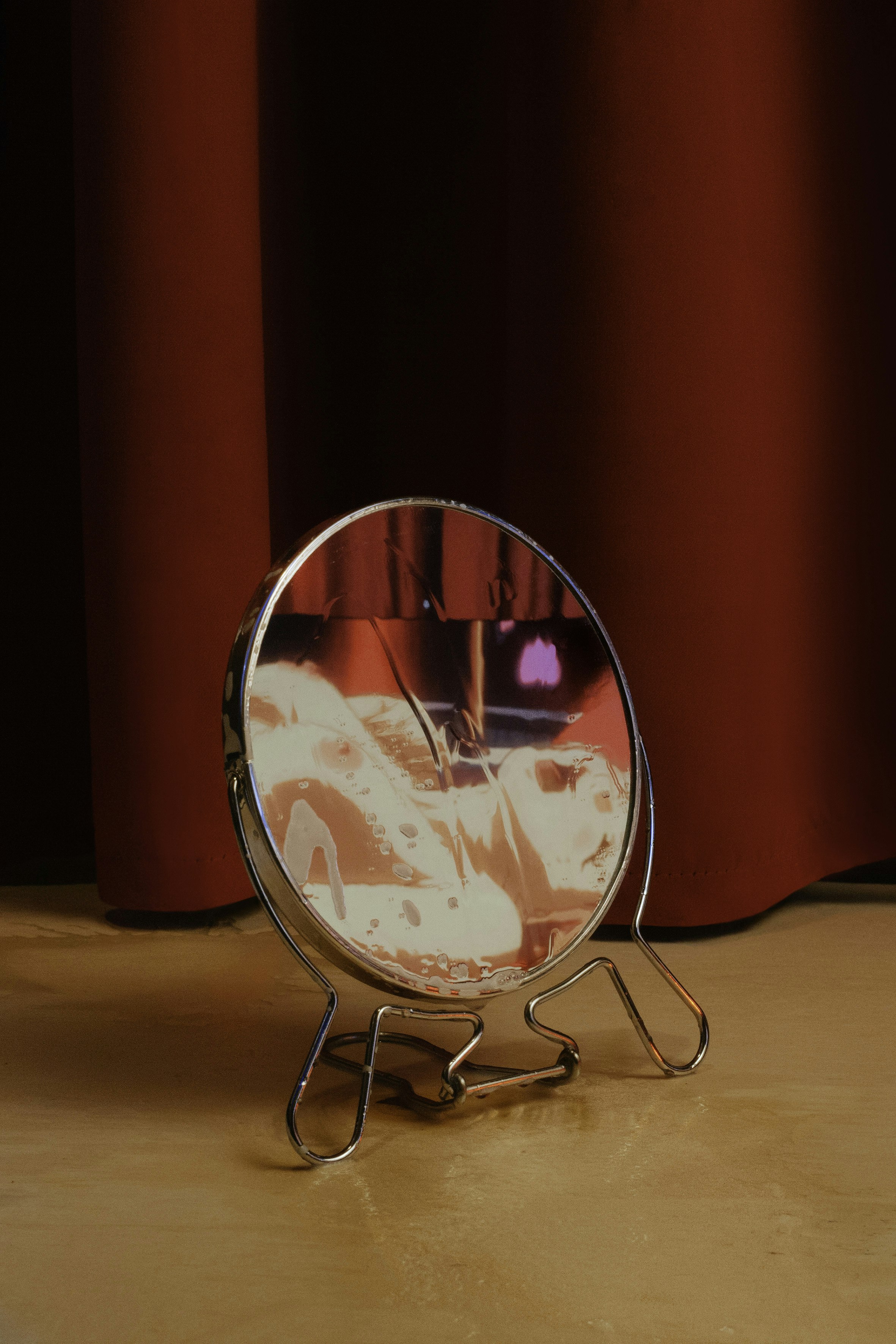

Mirror, Mirror and Skin of Evil, from the series You Are All I See, 2019 © Andy King
Three decades later, dating sims have become an industry in itself with orbital sub-industries based around it. Sex and birth rates are so low the Japanese government is stepping in to try and prevent future economic collapse. Otaku culture – socially awkward men who obsessively geek out on pop culture – gave birth to its own family of subcultures. Herbivore men is one such offshoot. More interested in scoring video game points than pursuing sexual relationships, herbivore men are notoriously withdrawn. The more extreme offshoot, fasting men, actively avoid sex with real women, preferring to date fictional 2D girlfriends instead. Although these subcultures appear extreme, they entered the mainstream consciousness over a decade ago. The effigy of a geeky loner exclaiming ‘real life is garbage’ and ‘2D women are better than 3D women’ was reabsorbed by the culture industry that created it, and spat back out as a recurring male archetype in films, mangas, TV shows, anime series, video games and dating sims. There is now a term referring to a specific love only possible with a 2D character – moe, or 2D Love. [5]
The more herbivore men retreated into their fantasies, the more dating sims stepped out into the real world. Dating sims underwent a crucial change – they no longer ended once a girl was ‘won’. The gameplay continues indefinitely and relationships can, in theory, last forever. Fictional characters are now able to chat, become augmented, and find proxy bodies in real women working in maid cafes. They are able to leave the confines of the screen and enter the physical space of a home to perform basic domestic labour. Some companies even go so far to sell marriage certificates – getting customers to pay them for the opportunity to claim eternal loyalty to their products. Although these fictional marriages are not legally recognised, there are growing 2D Love movements petitioning the Japanese government to change this.
Since 2D Love takes up a significant part of a 2D Lover’s time, there is now a growing body of analysis on this phenomenon from both within the community and academic circles. It’s important to stress that dating sims are regarded as being more than just a ‘fun game’ and the virtual relationships are taken quite seriously by members. Discussions are not limited to cataloguing differences between real and virtual – most argue for the futility of such a distinction – but they also explore the nature of love. When feelings of moe are theorised, they take on a religious zest. The love for a 2D character is compared to the love for a deity, and the intensity of devotion is measured using a moe scale. Both deities and fictional characters lack corporeality but are nonetheless considered to be real – existing as a transmittable idea with the power to influence reality through its host. This is why aficionados of the 2D Love movement refer to real women as 3D women – to call them otherwise insinuates the unreality of fictional girlfriends – a discriminatory offence that could draw accusations of reality bigotry. Likewise, the often repeated mantra “2D Love is pure love” emphasises the perceived moral purity of immaterial love, uncontaminated by the ‘filth’ of the human body and the inherent wickedness of human nature.
Moe characters usually take the form of high school girls in their early teens – diminutive and cute, even when enraged. Their infantile appearance communicates sexual purity, while their kawaiiness (the Japanese term for an aesthetic concept that emphasises innocence and childishness) sterilises sexual desire of their own, rendering them incapable of adultery. Sex is acted upon them, it does not come from within. Having no real desires of their own, they remain empty templates ready to be filled by someone else’s Self. Their personalities can be reprogrammed to match the desires of their owner, essentially enabling him to date himself in the gender and appearance of his choosing. The relationship between a 2D Lover and a fictional character is autoerotic – it has become pornified by the removal of Otherness. Much like Pygmalion who sought to create Galatea because he felt disgusted by the ‘promiscuity’ of real women, modern man sculpts his own Galatea through technology. Puritan 2D Lovers are careful not to repeat Pygmalion’s mistake and transform fantasy into reality, believing suitable women can only be imaginary because real women have become inadequate. Moe die-hards don’t just shy away from contact with 3D women, they actively reject it. This particularly toxic brand of 2D Love is not limited to Japan, but is thriving worldwide in countries such as Korea, China, Russia, Europe and USA.

Memes taken from 4chan.org by the author
The belief that women should be replaced with simplified copies is also advocated by volcels, short for voluntary celibates – the Western equivalent of the Japanese fasting men. Volcels have given up on sex because they believe that real women are no longer worth the effort to pursue. Not all volcels are political – many suffer from severe anxiety and low-esteem which impedes real-life social interactions – but those who have been radicalised are usually found under the banner of ‘Men Going Their Own Way’, or MGTOW. MGTOW have politicised their preferences for autoerotic relationships: they promote the use of technology to substitute women as a means for men to break free from the oppressiveness of contemporary human relationships. Unlike their apolitical brethren who view 2D Love as a token of their own romantic failures, MGTOW flaunt it as a victory over the opposite gender. Real women are not referred to as being 3D but rather 3DPD – ‘3-Dimensional Pig Disgusting’. According to MGTOW, if enough men remove themselves from the dating market, it would trigger a sex recession more radical than Japan’s. The falling birth rates would threaten the continuation of the human race, and eventually force desperate women to ‘up their game’ and become more like the domesticated simulacra they are being replaced by. MGTOW members blame financial and emotional problems on women, not on socioeconomic ills inherent in late capitalism or toxic masculinity. Likewise, they do not question their problematic media consumption habits, instead focusing on forcing real women to adapt to their preferences for 2D women – which are considered to be natural and immutable despite obvious dependency on modern day technology. An anonymous user exemplifies this view with a comment on 4chan: “I am strictly 2D because anime women act more like how real women should act than how real women actually act. I’ve been approached for sex but I’ve said no every time.”
Initially, the concept of 2D Love and voluntary celibacy seems far removed from an app like Tinder or phenomenon such as EarthPorn, but the reasoning is linear. If Tinder profiles present people in the best possible light, why ruin the illusion by going on a date when you can instead learn to cherish the fantasy? If you acknowledge to yourself that what makes Tinder fun is the act of Tindering and not meeting another individual, then replacing the human element seems like a logical next step. If fantasy is perfect, and real life is not, why settle? 2D Love is a lifestyle prioritising fantasy over real life. From this perspective, anything that elicits feelings of love presented through a screen can fall under the category of 2D Love, even desktop backgrounds depicting EarthPorn and falling in love with a Tinder profile.

Watching You Watching Me, from the series You Are All I See, 2019 © Andy King
MANUFACTURED DREAMS: GALATEAS FOR ALL
Because real life is fucking bullshit. People are legit shit and love doesn’t exist. – Anon
Virtual girlfriends are not manifestations of a Platonic Female Ideal but products owned and controlled by corporations which generate larger revenues if relationships are maintained for years. Many companies offer elite packages ranging from simple upgrades of clothing to physical 3D replicas – more extravagant offerings include romantic get-away vacations for ‘two’. Because 2D characters lack a physical presence, fans are often compelled to bridge the divide through consumption – ordering real cakes bearing the names of their beloved, uploading augmented reality selfies and obsessively collecting expensive merchandise associated with their loved one in order to prove their commitment to other fans.
Like Tinder, the dating sim industry has no incentive to facilitate long-lasting connections between humans when singledom generates more income. The commodity is not the provision of a solution to loneliness, the commodity is the maintenance of users’ attention. To win at online dating is to eventually stop playing the game. The fact that a substantial amount of users end up Tindering for its own sake might not have been its creators’ original intention, but it is a welcome one.
Escapism and daydreaming are necessary activities: to change the future one must first envision an alternative. However, passive escapist realities which prioritise financial gain above all else are not imaginative or emancipatory. Moe characters exaggerate already existing ‘femininities’ – they do not attempt to challenge or change them. Existing tropes are easier to sell, and are therefore endlessly repeated until they seem unchangeable. What’s more, passive escapist realities are parasitic, feeding off dissatisfaction and vulnerability. Otakus are open about their emotional sensitivity and their wish to find a painless love. Consequently, their 2D girlfriends are manufactured to be harmless with infantile, reprogrammable personalities. How this will affect their relationships with other human beings is of no concern to profit-driven producers, who try to solve problems caused by consumption with more commodities.

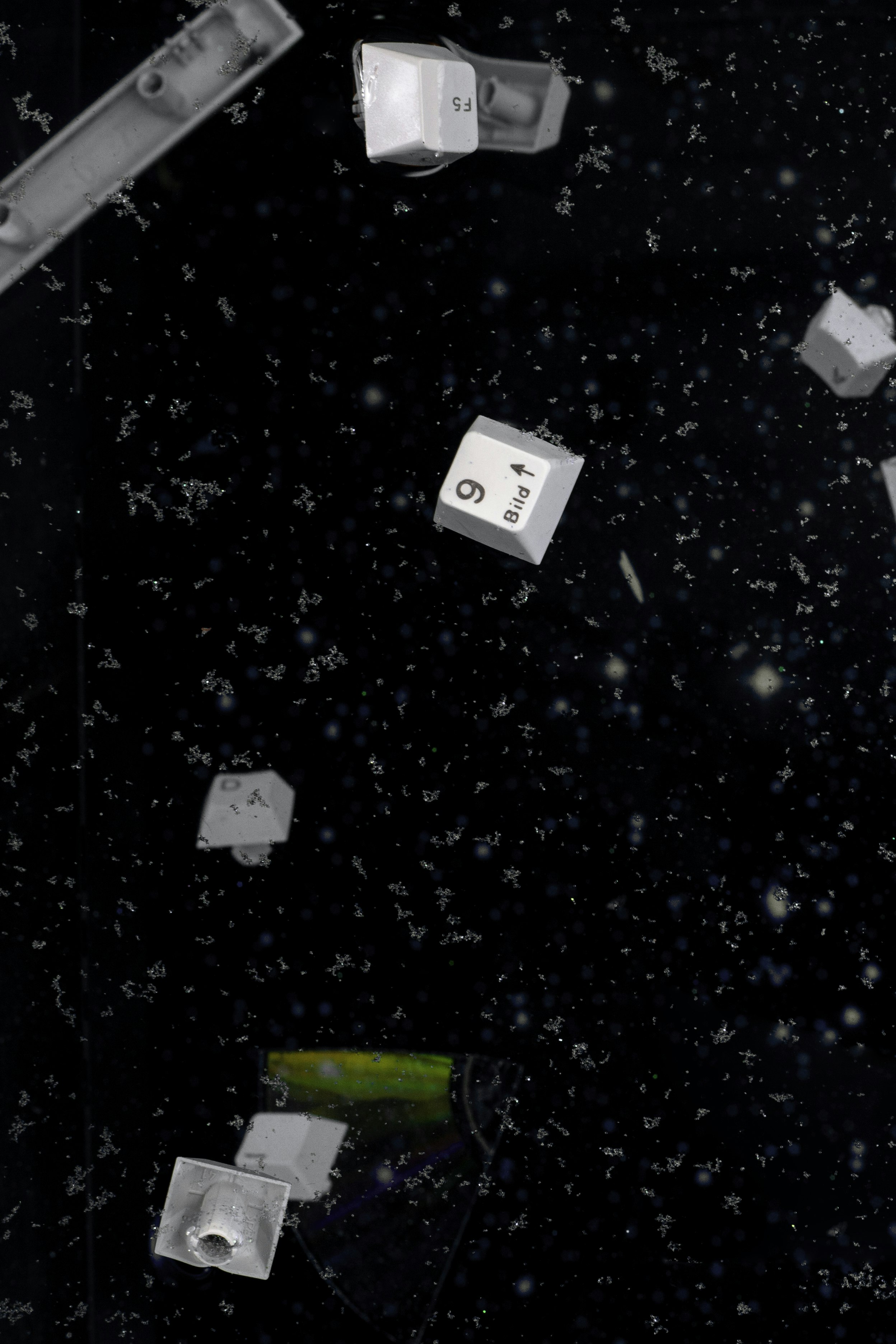
Alienated Trekkie Still Klings on and BILD2FLOAT4EVER from the series You Are All I See, 2019 © Andy King
What makes solitary experience self-perpetuating – and dating sims addictive – is that the more time we spend with ourselves, the harder it becomes to connect to others. Dating sims make real women seem more disagreeable by contrast, because like the human Galatea, they cannot compete against characters that are selfless. Likewise the salient, mosquito-free CabinPorn images make reality pale in comparison. If I am consuming perfect depictions of rustic cabins, I am more likely to be disappointed when I move into one, and because I know I will be disappointed, I choose to consume CabinPorn. My consumption has not inspired change, but stagnated it by replacing reality with a poor, frictionless and static copy.
This lack of concern for emotional affect is symptomatic of neoliberal ideology, which is based on the naive assumption that human beings are rational, born equal and operate in a world with limitless resources. If individuals fail, the system blames them for not trying hard enough. At the same time, attention is a very limited resource. Accordingly, industries take advantage of any flaw or vulnerability in their customers, making it more difficult for an individual to succeed. An unequal society built on enforced competition and unrealistic expectations is unsustainable. It churns out depleted Selves desperately seeking absolution of their failures and affirmation of their inner worth. Unable to withstand the slightest confrontation, burned-out individuals become unforgiving of minor differences. Instead of opening up to love which requires energy and dedication, they seek out paths of least resistance – non-confrontational escapist realities that mirror the fundamentally familiar: their Selves. [6]
According to philosopher Byung-Chul Han, this now constitutes the predominant mode in which Selves engage with the world. He writes: “the crisis of love does not derive from too many others, so much as from the erosion of the Other.” [7] In other words, it doesn’t matter how many sexual partners and relationships we have, we cannot truly love someone until we break away from the narcissistic desire to project the Self onto others, and learn to confront, accept and love that which is alien to us. Since pornography is created for the sake of consumption, rather than reflection, it doesn’t challenge the Self, merely encourages further consumption. Because pornographic images do not contradict, disagree or rebel, the Self becomes trapped in a cycle of projection. What is harrowing about dating sims is that their adaptive algorithms make a one-directional medium like television seem multifaceted by comparison. Whereas television’s monologue came from a collective of minds, the dating sim is essentially an algorithmically guided monologue echoing the Self. “Never before have we in the West had it so good, and never have we felt so bad”, wrote the clinical psychologist Paul Verhaeghe. [8] Never before have we had such a proliferation of pornographies, felt this alone, and needed so much more.
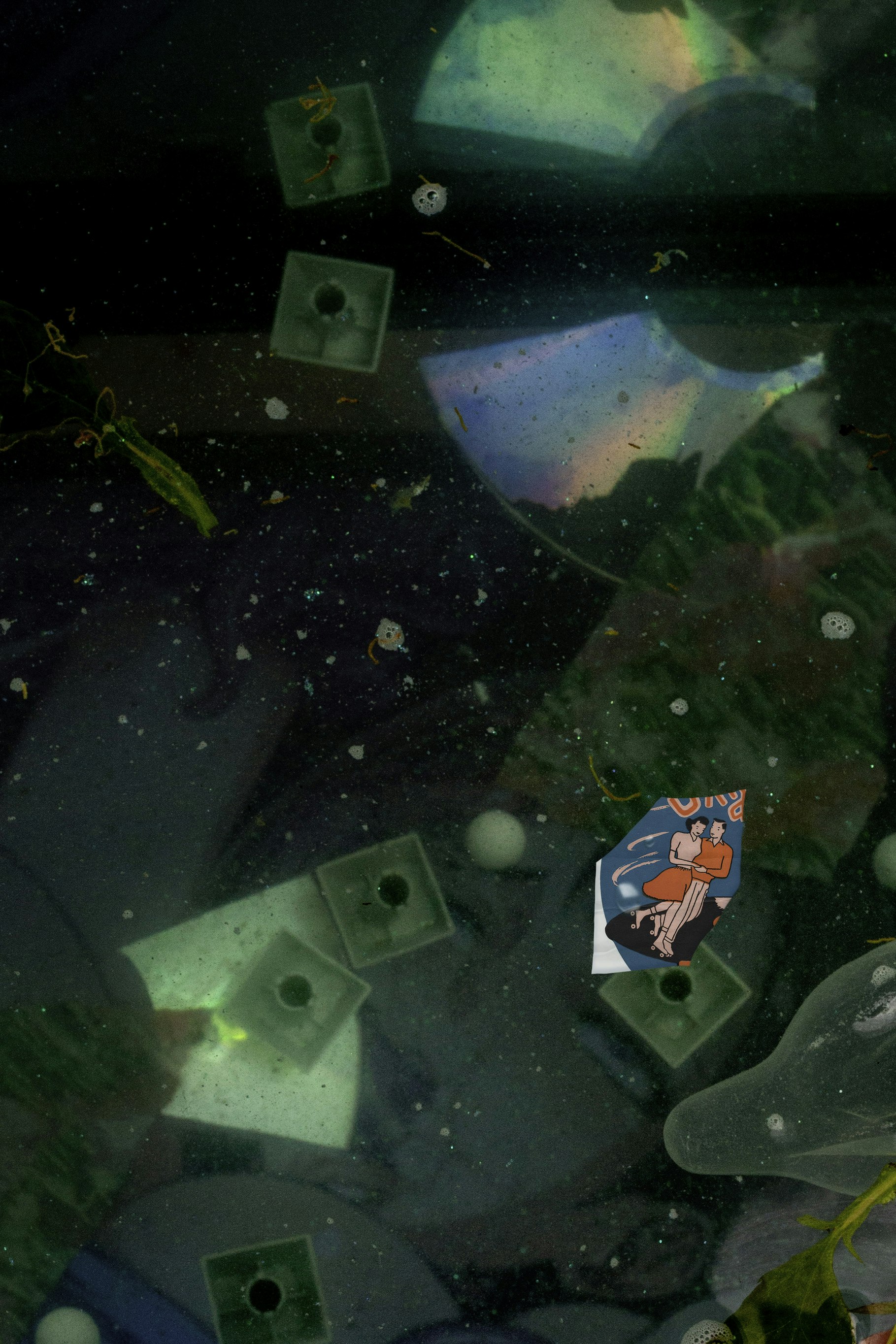
Debris, from the series You Are All I See, 2019 © Andy King
NOTES
[1] You Are All I See – An Altarpiece to the Imaginary is a series of photographs by Andy King that play out a fictional love story between a voluntary celibate man and his favourite fantasy women. The protagonist is an anxious recluse with a paralysing porn addiction, and a hopeless romantic at heart. Living in a deteriorating environment, surrounded by trash, he does not notice his world falling apart, because his eyes remain interlocked with the 2D eyes of his beloved.
[2] Robert Epstein is a well-known figure who published several books on cognitive psychology and written about human relationships prior to the incident. This shows that knowledge does not guarantee immunity.
[3] This is when the illusion began to fall apart. The chatbot was unable to provide an address.
[4] Defenders of otaku culture point out that the shift from the pursuit of capital to the pursuit of pleasure is a positive development, liberating men from toxic careerism. However, they mistakenly assume that pleasure is distinct from capital.
[5] Moe has multiple meanings and is not limited to describing an affectionate response to humanoid fictional characters. For example, cute depictions of objects or animals can also be described as being moe. The defining feature of moe is that the desire cannot be returned. For a more extensive analysis, see Patrick W. Galbraith, Moe Manifesto – An Insiders Look at the Worlds of Manga, Anime, and Gaming (Tokyo; Rutland, VT: Tuttle Publishing, 2017).
[6] Byung-Chul Han, The Expulsion of the Other (Cambridge: Polity Press, 2018).
[7] Byung-Chul Han, The Agony of Eros (Cambridge, MA: MIT Press, 2017), 1. See also by the same author: Saving Beauty (Cambridge: Polity Press, 2018).
[8] Paul Verhaeghe, What about Me?: The Struggle for Identity in a Market-Based Society (Melbourne; London: Scribe, 2016), 108.
Cluster: Porn